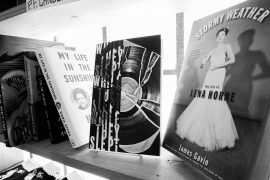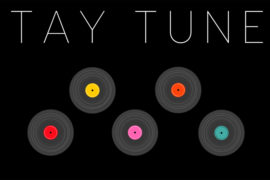Former songwriter, singer and guitar player of The Civil Wars and co-founder of Single Lock Records John Paul White played a set at The Hi-Fi last night that brought together an audience of all different ages. PATTERN was able to pick his brain before his meet-and-greet to discuss writing versus producing, solos versus duos, and the art versus business side of the music industry.
Photos by Rock Candy Photo.
Aubrey Smith: Has the transition between writing and producing songs between different genres been relatively seamless?
John Paul White: I won’t say that anything has ever been seamless for me. There’s a learning curve to all of it. When I was home, producing records, and helping other people, I used a completely different part of my brain. That was actually enjoyable for a while. These songs started popping up in the back of my head and would not go away until I finally let them come out. Making those records spurred this record coming out, so I can blame it on that.
AS: What do you mean by a different part of you brain?
JPW: Instead of me of focusing on exactly what I want, what I need, what makes me happy, what clicks with me — I have to facilitate somebody else’s vision. That’s a whole different way to look at a project. Instead of thinking ‘what would I do,’ I have to think ‘what do they want to do and how do I help them be as good as an artist as they can be and actually capture their voice?’ It’s a whole different thing because I can just internalize everything when it’s my own, and it’s a one-stop shop. I know if I like it, and I know if I don’t. But if it’s somebody else’s, not only do I have to figure out what’s in their head; I also have to know in the back of my mind that it is possibly their one shot. There’s a huge amount of responsibility and accountability there that I’m not used to. I don’t take that for granted.
AS: Does that pressure push you to exceed or intimidate you?
JPW: It doesn’t intimidate me. I definitely feel the weight of it, so I strive to do as good a job as I possibly can and to make sure that what we’re accomplishing is exactly what they want. They’re not just saying ‘yes’ and feeling pressured to make a record that I want to make. That doesn’t do either one of us any good.
 AS: What’s it like working on the business side of the music industry with Ben Tanner and Will Trapp?
AS: What’s it like working on the business side of the music industry with Ben Tanner and Will Trapp?
JPW: Working with Ben and Will is amazing. We’re good enough friends that we can be honest with each other when we do or don’t like something. We push each other to be better. We all know that we don’t know what we’re doing. And we probably never will. We’re always trying to find a better way to do what we’re doing, not to do things necessarily the way people always have. Ben plays with Alabama Shakes, and of course I have a background in music. Will does not. Will’s more of a financial guy. So he comes at it from a completely different, maybe even naive, viewpoint. He asks us why labels do things the way they do. And we have to look at each other and say, ‘I don’t know, that’s just how it’s always been done.’ So it’s a really good process. I’d much rather just make music.
AS: Sometimes being such a creative, it’s difficult to get geared toward a more business mindset.
JPW: It is, but it’s really been good for me. It’s made me a better producer — it’s made me a better artist because I see where all the bodies are buried. I see what’s important and what’s not. And it helps me be a better label guy because of my artistry. I can always keep the artist hat on and figure out what’s best for our artists and not stay on one side of the table too long.
AS: Compare and contrast solo artistry with being in a duo.
JPW: It’s a lot the same. The difference now is that I’m in a band. Instead of there being less people on stage, there’s a lot more. I’m managing being able to play with a drummer and a bass player again, which I haven’t done in 10 years. So that’s awkward. It took some learning to do it because with The Civil Wars, I’m the drummer. I can speed up, I can slow down, I can do whatever I want. With the band, I got to lock in. He’s the drummer; I got to follow him. So that’s definitely been a learning curve. This time around, I’ve been a lot more hands-on with the business side of how shows and how tours are set up. In the past, things happened so fast that there was no way I could keep up. We’re taking things in a slower, more organic, longer arc approach with this.
 AS: You say that writing vaguely is key in your songwriting. Would you give that advice to every song writer?
AS: You say that writing vaguely is key in your songwriting. Would you give that advice to every song writer?
JPW: I think everyone needs to follow their heart. I know many amazing musicians and artists that write incredibly personally. Everything on that page is right out of their vein. I get it.That works for some people. Some of my favorite artists like Elliott Smith… I got a feeling that everything he put on the page, he was feeling it. And that’s visceral and enjoyable, but that’s not what I enjoy doing. To me, it’s boring. My life is boring to me. Your life is a lot more interesting to me. The people that I love like John Prine and Chris Christopherson and Jason Isbell, they typically all write through characters. There’s some truth there. There’s some of their personal life in there. But more often than not, they’re writing songs that you can feel it’s your story. Or it’s your mom’s or it’s you boss. You don’t have to stand outside of it and marvel at it as my story and no one else’s. That’s more intriguing to me. I feel like there’s a lot more chance of it being powerful to a lot more people if I allow that to happen.




